
Bale Grist Mill State Historic Park is a California state park located in Napa County between St. Helena and Calistoga. The park is the site of a water-powered grist mill that was built in 1846 is one of only two water-driven mills remaining west of the Mississippi River.

Rushland is an unincorporated community located in the northwestern corner of Wrightstown Township, Bucks County, Pennsylvania, United States.

The John H. Addams Homestead, also known as the Jane Addams Birthplace, is located in the Stephenson County village of Cedarville, Illinois, United States. The homestead property, a 5.5-acre (22,000 m2) site, includes an 1840s era Federal style house, a Pennsylvania-style barn, and the remains of John H. Addams' mill complex. The house was built in two portions, in 1846 and 1854 by Addams; he added some minor additions during the 1870s. Other major alterations took place during a 1950s modernization of the home. The homestead has been noted for its significance to industry and politics. On September 6, 1860, future Nobel Peace Prize recipient Jane Addams was born in the house.
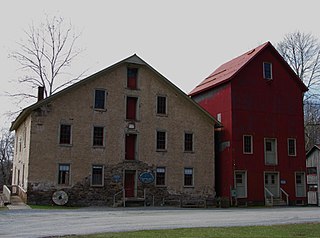
Prallsville is an unincorporated community located along New Jersey Route 29 by the border of Stockton and Delaware Township in Hunterdon County, New Jersey. The Delaware River and Wickecheoke Creek border the community. The Prallsville District was listed on the National Register of Historic Places in 1979.

Victoria Grist Windmill is an historic gristmill in Memorial Square in Victoria, Texas, United States. The windmill was added to the National Register of Historic Places on April 30, 1976, and became an American Society of Mechanical Engineers Landmark in May 1991.

Williston Mill Historic District is a national historic district in Denton, Caroline County, Maryland. It consists of two historic structures—a grist mill and a miller's house—which share the acreage with the mill stream and race that empties into Mill Creek, a tributary of the Choptank River. The Williston miller's house is a two-story, four-bay single-pile frame dwelling, built originally between 1840 and 1850 with later 19th century expansions. The mill building dates from around 1830–1840, with the two-story section built around 1895. It is one of two grist mills that remain standing in Caroline County.
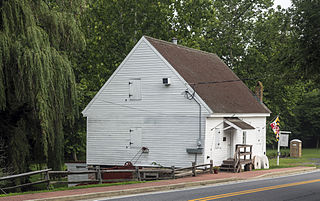
The Wye Mill is the oldest continuously operated grist mill in the United States, located at Wye Mills, Queen Anne's County and Talbot County, Maryland, United States. It is the earliest industrial site on the Eastern Shore in continuous use; dating to the late 17th century. It is a wood-frame, water-powered grist mill, with a 19th-century 26 HP 10-foot-diameter (3.0 m) Fitz steel overshot wheel. The mill retains nearly all of its late-18th-century equipment. The Wye Mill was one of the first grist mills to be automated with the Oliver Evans process, which is still in use today.

The Wayside House is a historic house located in Cedarburg, Wisconsin. It was built by Fredrick Hilgen, who later co-owned the Cedarburg Mill, and is considered the father of Cedarburg. It was added to the National Register of Historic Places on March 17, 1982.

Hanford Mills Museum, also known as Kelso Mill, is a historic grist mill and sawmill and national historic district located at East Meredith, New York in Delaware County, New York. The district contains nine contributing buildings and three contributing structures. The complex includes both natural and structural facilities. It includes a mill race from Kortright Creek to the damned up Mill Pond which supplies the waterwheel, a spillway for the pond's overflow, a section of old (1900) New York Central Railroad track, two railroad bridges crossing Kortright Creek, and a variety of buildings. The main structure is a mill building dating to the 1820s with additions from the 1870s, 1880s, and 1890s. The four story wood-frame structure is approximately 150 feet long and 120 feet high. Also on the property is a one-story depot building with grain elevator and storage facilities. It is now operated as a museum. It was listed on the National Register of Historic Places in 1973.
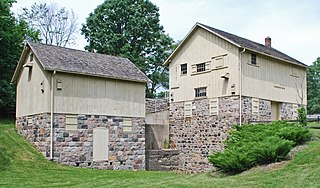
The Parker Mill, also known as Parker Mill Park or Parker Mill Complex, is a mill located at 4650 Geddes Road, east of Ann Arbor, Michigan. The mill is a well-preserved example of a small-scale grist mill operation that was once common in Michigan. The mill and nearby Parker House were listed on the National Register of Historic Places in 1982.

Hays Creek Mill, also known as McClung's Mill, Patterson's Mill, and Steele's Mill, is a historic grist mill located near Brownsburg, Rockbridge County, Virginia. It dates to about 1819, and is a 2+1⁄2-story, rectangular wood-frame building on a limestone basement. The building measures 35 feet by 45 feet and retains an iron overshot wheel measuring 15 feet in diameter and 5 feet thick. Associated with the mill are the contributing miller's house, garage that once served as a corn crib, and cow barn. The Hays Creek Mill remained in operation until 1957 in a number of capacities as a grist, saw, and fulling mill.
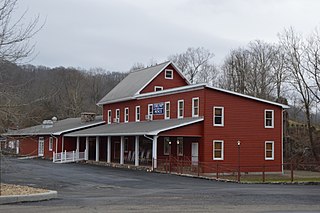
Clinch Valley Roller Mills is a historic grist mill complex located along the Clinch River at Cedar Bluff, Tazewell County, Virginia. The main building was built about 1856, and consists of a 3 1/2-story, timber frame cinder block with later 19th and early-20th century additions. There are additions for grain storage; a saw mill, now enclosed and housing the mill office; the mill dam site with its associated culvert, weirs, flume and turbines; and the 1 1/2-story shop building. The main section is believed to have been rebuilt after a fire in 1884.
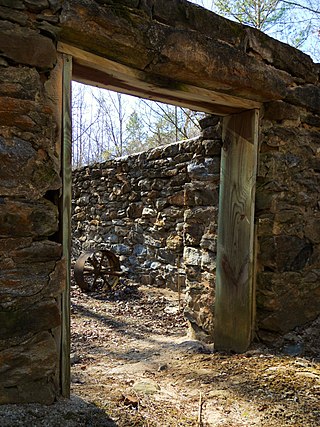
The McCosh Grist Mill is a historic grist mill near Rock Mills in Randolph County, Alabama. The mill was built in the early 1870s, and is the oldest extant stone grist mill in Alabama. It was built by James Eichelburger McCosh, whose grandfather, Jacob Eichelburger, operated earlier mills that were similar to those in his native Pennsylvania. McCosh also owned 500 acres of farmland nearby, and later added a cotton gin to the site. The mill operated until 1958, and was purchased in 1970 by the United States Army Corps of Engineers as part of the West Point Lake reservoir project.

The Swift Creek Mill is a historic grist mill at 17401 Jefferson Davis Hwy in South Chesterfield, Virginia, just across Swift Creek from the city of Colonial Heights. Built about 1850, the present brick mill structure is one of a long line of mills that have occupied this site since the mid-17th century. The mill was adapted for use as the Swift Creek Mill Theater in the 1960s. It was listed on the National Register of Historic Places in 1974.

Valley Mills is a historic building located east of Garnavillo, Iowa, United States. This is one of at least four mills that was located on Buck Creek in the 19th century. They included both grist and lumber mills. The first mill located on this site was a lumber mill built in 1850. A change in ownership and an expansion of the business led to the construction of this grist mill three years later. The two-story structure is composed of roughly dressed limestone, has an exposed basement, and is capped with a gable roof. It was built for B. E. Schroeder and J. H. Kueuzel, who owned the mill until 1867. Kueuzel then held sole ownership into the 1880s. The building was listed on the National Register of Historic Places in 1976.
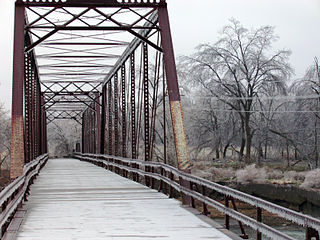
Caplinger Mills Historic District is a national historic district located at Caplinger Mills, Cedar County, Missouri. The district includes one contributing site and three contributing structure related to the development and use of water power in Cedar County. It developed between about 1895 and 1943, and includes a grist mill site, dam, power house and double span Pratt with two pony truss approach spans bridge (1895).

Ruff's Mill and Concord Covered Bridge is a historical site in Smyrna, Georgia. It was listed on the National Register of Historic Places in 1980.

The Hixson–Skinner Mill Complex, also known as Cole's Grist Mill Complex, encompasses a historic grist mill and two houses located where Still Valley Road crosses the Pohatcong Creek, about one half mile east of Springtown, in Pohatcong Township, Warren County, New Jersey. It was added to the National Register of Historic Places on December 2, 1982 for its significance in commerce and industry. It includes 4 contributing buildings and 2 contributing structures.
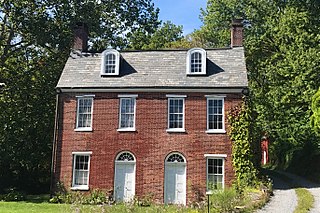
Springtown is an unincorporated community located at the intersection of Springtown Road and the Pohatcong Creek in Pohatcong Township, Warren County, New Jersey. It was named after the many small springs in the valley.

Taylor's Mill Historic District, a 26-acre (11 ha) historic district featuring the gristmill Taylor's Mill, is located along Taylor's Mill Road and Rockaway Road near Oldwick in Readington Township, Hunterdon County, New Jersey. It was added to the National Register of Historic Places on June 11, 1992 for its significance in architecture, exploration/settlement, industry, and military. The district boundary was increased by 8 acres (3.2 ha) in 1997 to cross the Rockaway Creek and extend into Tewksbury Township.























